Video from the November 7, 2019 event with José Bravo.
Combatting False Solutions in Climate Policy
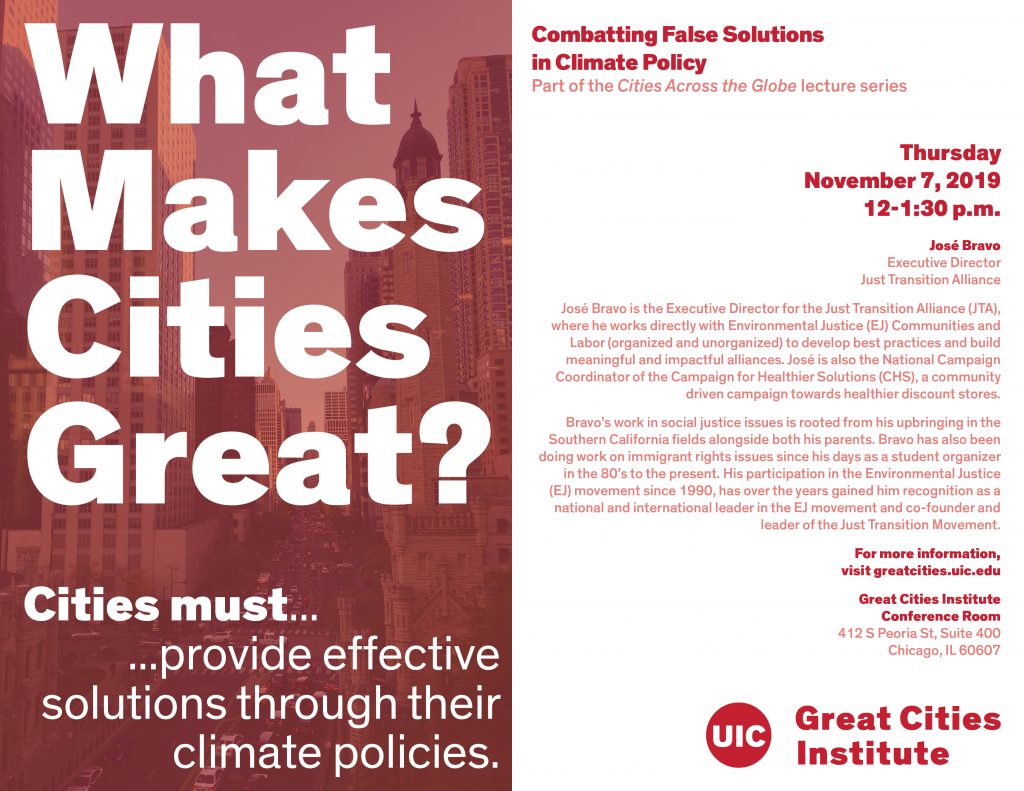
José Bravo is the Executive Director for the Just Transition Alliance (JTA), where he works directly with Environmental Justice (EJ) Communities and Labor (organized and unorganized) to develop best practices and build meaningful and impactful alliances. José is also the National Campaign Coordinator of the Campaign for Healthier Solutions (CHS), a community driven campaign towards healthier discount stores.
Bravo’s work in social justice issues is rooted from his upbringing in the Southern California fields alongside both his parents. Bravo has also been doing work on immigrant rights issues since his days as a student organizer in the 80’s to the present. His participation in the Environmental Justice (EJ) movement since 1990, has over the years gained him recognition as a national and international leader in the EJ movement and co-founder and leader of the Just Transition Movement.
If the above RSVP form is not working, please email gcities@uic.edu to RSVP.
Cooperatives and Capabilities: International Perspectives
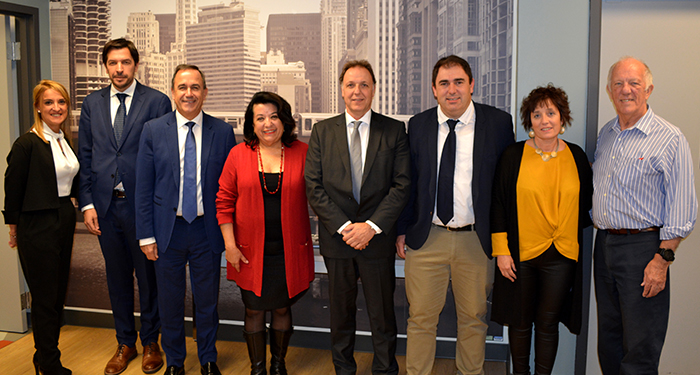
Last month, with Manufacturing Renaissance, we were so pleased to host a delegation from the Basque Country on building a sustainable and inclusive society. The Basque Country is the home of Mondragon – a world leader in the development of worker cooperatives.
The Basque County is a semi-autonomous region in northern Spain that represents a model of development that is inspiration and provides an excellent example of the power of advanced manufacturing as a foundation for building a society that is productive, secure, and inclusive. Their programs and approaches are useful models that we can learn from in developing a close and effective partnership between manufacturing companies, government and civil society.
Included in this delegation was Jorge Arevalo, Deputy Minister for Vocational Training and Nicolas Sagarazu, Director of Planning and Organization of the Department of Education. They and other visitors spoke about their unique approach to vocational training, providing a number of useful insights about how to establish conditions for a creative learning environment. Click here to view their presentations.
Worker cooperatives have a long history in many societies throughout the world and even in Chicago. As national and local networks have formed to assist the formation of worker cooperatives, GCI produced a report last year on Policy Recommendations for Amendments to the State of Illinois Worker Cooperative Statute.
In keeping with GCI’s continued effort to elevate worker cooperatives as an important community development strategy, we are pleased to feature a report back from Lucas McGranahan, Senior Research Specialist, Great Cities Institute, on human development and worker cooperatives.
Cooperatives and Capabilities: A Report from London
Lucas McGranahan, Senior Research Specialist, Great Cities Institute
In September I had the opportunity to present at the annual conference of the Human Development and Capabilities Association, hosted this year by University College London. I put together a panel for HDCA because I believe in the organization’s holistic vision of development: the point isn’t just to increase nebulous economic indicators such as GDP but to enhance people’s effective freedoms—their capabilities—across a range of dimensions including health, education, work, and more.
The point of economic development isn’t economic development: it’s human development.
The panel I chaired, “Cooperatives and Capabilities,” considered a topic that many of us at the Great Cities Institute are deeply interested in: the advantages of the cooperative business form in enabling people to live stable, autonomous, and dignified lives. My own presentation argued that it’s not enough for development scholars and practitioners to focus on decreasing unemployment. They need to focus on improving the quality of work, which in turn depends on the structure of work—who owns capital and who makes decisions at all levels of the enterprise.
My co-presenters backed up my theoretical paper with concrete studies: Kenneth Stikkers From SIU Carbondale outlined how capabilities are fostered by the Mondragon Cooperatives in the Basque Region of Spain, a successful network of enterprises that explicitly treat capital as instrumental to labor; and Pasquale de Muro of Roma Tre University discussed how producer cooperatives in developing countries help individual farmers achieve collective agency, affording them access to markets and credit that would otherwise be beyond their reach.
The audience of the three-day conference was highly international and interdisciplinary, with a mix of academics and practitioners arriving from scores of countries. This eclectic assortment made for interesting conversations at every session, every coffee break, and every informal pub meetup. What everyone had in common was an idea that is worth preserving: poverty is multidimensional, not just a lack of money or resources. The dimensions of poverty include a lack of autonomy, democracy, and healthy interdependence in people’s economic lives. It is here that cooperatives show a way forward.
Next year, the annual conference of the Human Development and Capabilities Association (HDCA) will be in Aukland, New Zealand from June 30- July 2, 2020.
What The West Side Lost
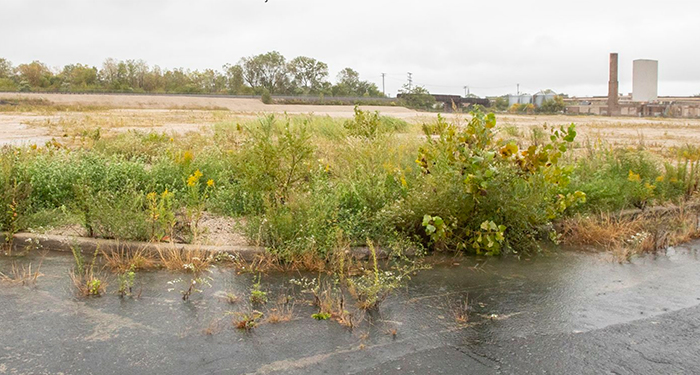
(Manuel Martinez/WBEZ)
Teresa Córdova, director of the UIC Great Cities Institute and professor of urban planning and policy, is a featured expert in a WBEZ story about manufacturing companies disinvesting in Chicago and the effect on neighborhoods that is still felt today, particularly on the city’s West Side. Cordova says that manufacturing still presents the greatest opportunity for job growth and if a company were to relocate in a neighborhood with an available workforce, the overall positive economic impact could be experienced beyond just those who are directly hired.
Teresa Cordova, director of the Great Cities Institute at the University of Illinois at Chicago, said manufacturing still presents the greatest opportunity for job growth.
“The kind of manufacturing that was here probably isn’t coming back,” Cordova said. “But there’s new kinds of manufacturing that’s occurring. There’s something that we now refer to as precision manufacturing, or advanced manufacturing.”
Automation is Making Warehouse Work Harder, Not Smarter

Beth Gutelius, associate director of the Center for Urban Economic Development and senior researcher at the Great Cities Institute at UIC, joined Seattle’s Morning News with Dave Ross on KIRO Radio (97.3 FM) to discuss her recent co-authored report that examines how technology will impact the warehouse industry and workforce over the next decade.
Robots aren’t taking warehouse employees’ jobs, they’re making their work harder
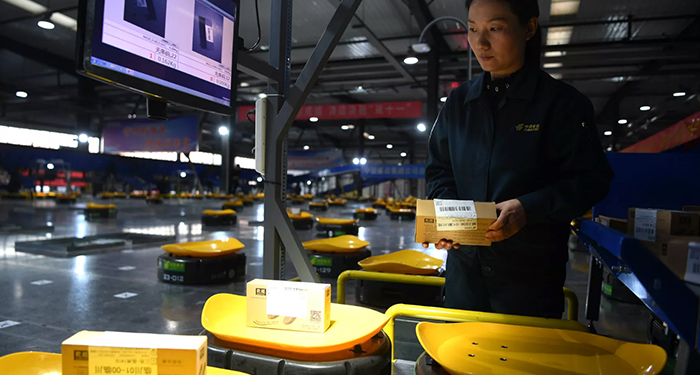
A new report from researchers at the University of Illinois at Chicago shows what the effects of technology on workers will really be. Visual China Group via Getty Images (Excerpted from Vox Media)
Recode, Vox Media’s technology news website, features a story about a new report from Beth Gutelius, associate director of the Center for Urban Economic Development and senior researcher at the Great Cities Institute at UIC, and Nik Theodore, director of the Center for Urban Economic Development, UIC professor of urban planning and policy, and fellow at the Great Cities Institute, that examines how technology will impact the warehouse industry and workforce over the next decade. The report, commissioned and released by the UC Berkeley Labor Center and Working Partnerships USA, says that rather than technology creating widespread job loss, it will lead to declining job quality in warehouses.
According to a new report by researchers at the University of Illinois that focused on warehouse work automation and was shared exclusively with Recode, emerging technologies aren’t actually going to replace the over 1 million warehouse workers in the US anytime soon. But over the next 10 years, the technology may make their lives harder.
The report shows how technologies are modifying the day-to-day work of people who organize, store, and package physical goods in warehouses. It found that technology and automation can help workers by reducing the “monotonous and physically strenuous activities” of, say, lifting heavy packages. But it also could affect workers’ health, safety, and morale, and accelerate the rate at which employees are replaced. That’s because tools like self-driving shelving carts, body sensors, and AI-powered management systems are putting pressure on workers to work harder, faster, and under more scrutiny. This is helping boost productivity but could be bad for workers, the report argues.
“The next decade is a story not about job loss, but more so about changes in job quality,” said Beth Gutelius, associate director of the Center for Urban Economic Development at the University of Illinois at Chicago, who authored the paper along with colleague Nik Theodore, a professor of urban planning and policy. “Technology has led to workers being pushed harder and also their privacy getting violated.”
What will new technology mean for the future of warehouse work?
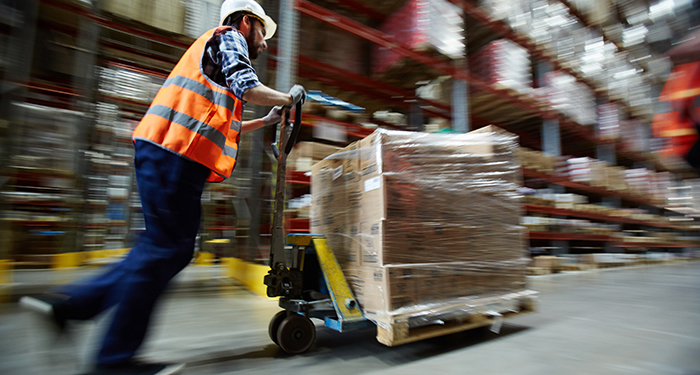
Pressmaster/Shutterstock.com
The following is a guest blog by GCI Senior Research Specialist Beth Gutelius on the release of a new report authored by her along with Nik Theodore, Ph.D. This blog is concurrently posted on Medium.
Technology has changed the way many people shop, fueling the meteoric growth of e-commerce. With a click, customers now expect a box filled with any number of goods to arrive at their doors — sometimes the very same day, a sea change from even a few years ago. While some of the ripple effects of e-commerce are more obvious — like the army of last-mile delivery drivers on the streets — others are largely hidden from view, tucked away in cavernous buildings in industrial parks, where warehouse workers hustle to assemble orders. The pressure to meet quick order turnaround, driven largely by Amazon’s standard-setting delivery promises, has contributed to onerous labor conditions in warehouses across the country, conditions that appear poised to worsen in the coming years.
In a report published today with Nik Theodore, Ph.D., professor of Urban Planning and Policy at the University of Illinois at Chicago, and commissioned by the UC Berkeley Labor Center and Working Partnerships USA, we examined how technological changes in warehouses across the United States might impact workers and reshape the nature of warehouse work.
Over one million people work in warehouses across the U.S., a number that is growing due in part to the rise of e-commerce. The industry is the invisible backbone of the economy: almost everything we buy passes through a warehouse at some point in its journey. Yet we rarely think about them, or the workers inside. To understand how technology might be used in warehouses and the potential impacts on jobs, we explored the decision-making factors warehouse operators face for insights into what the future may hold. We interviewed warehouse operators, management consultants, and technology providers; attended industry conferences; and reviewed current literature and data on the warehousing industry. Here’s what we found:
In contrast to the seemingly endless stream of reports predicting widespread job loss due to automation, our study shows that over the next decade job quality–not quantity–is a far more pressing concern. That is, the working conditions and content of warehouse jobs are likely to change, with potentially negative impacts on workers. We identified three main categories of potential shifts in the content of workers’ jobs: work intensification, algorithmic management, and de-skilling.
Warehouse work tends to be hard on workers’ bodies. Some new technologies could reduce the most grueling parts of the job, like walking or awkward lifting positions. Our research found, however, that these potential improvements in job quality will likely be coupled with increases in the pace of work, which could lead to a net deterioration of working conditions. For example, Amazon’s MissionRacer video game pits workers against each other to see who can assemble orders the fastest. Algorithms that govern the pace of work can increase pressure to work quickly, introducing new forms of workplace control and surveillance, where the monitoring of workers’ performance is granular, scalable, and relentless. These technologies are critical in the push for speed-ups. Wearable devices and sensors track workers in new ways, and can take away their autonomy and flexibility.
De-skilling is the process of breaking up a job into smaller bits of work and figuring out which activities to simplify or to which technology could be applied. For example, some autonomous mobile robots lead workers across a warehouse, choosing walk routes, pacing the worker’s speed, and simplifying the process of picking an order. These robots can remove nearly all decision-making on the part of workers, which for employers means you can hire just about anyone to do it–including temporary workers. For workers, it could lead to lower wages and more job insecurity.
Taken together, these changes in warehouse work could lead to an increase in health and safety issues, as well as increased employee turnover due to overwork and burnout. Currently, people working in warehouses experience work-related injuries at a rate nearly twice that of other private industry workers – higher than construction, coal mining, and most manufacturing industries. Health and safety impacts could intensify as workers are incentivized to increase their pace of work via new technologies like gamification and monitoring.
And we have to remember that any increase in risks on the job will be felt unevenly — according to Census data, 66% of front-line workers in warehouses are people of color, despite making up only 37% of the overall labor force. In particular, changes in warehouse working conditions, including those that could lead to chronic pain and psychological stress, could disproportionately affect Latinx and Black communities, with persistent, long-term impacts.
What is driving these trends and the transformation of the warehousing industry is e-commerce. The combination of labor-intensive e-commerce order picking and the speed with which these orders must be shipped is motivating experimentation with new technologies. The effects of Amazon are visible across the industry, as companies clamber to find ways to compete and many look to new technologies to gain efficiencies.
Despite our concerning findings, we do not believe warehouse workers are necessarily doomed — if we can break out of the commonly-held notion that the path of technological change is inevitable. Technology is neither inherently good nor bad. Humans create technologies, and our biases get baked in on the front end; and humans can exercise choices about how technologies get implemented and overseen. We will need bold, creative thinking about how to ensure both innovation and shared prosperity, and what roles policymakers, employers, and workers need to play to shape the trajectory of technological change.
Warehouse operators stand to benefit significantly from new technologies, but it’s critical that these gains be shared, that workers be involved in identifying which efficiencies should be prioritized and what hazards are being introduced, and that experimentation unfolds with regard to for more than just productivity increases. Absent this, the process of technological change in warehousing will resemble a win-lose proposition, where the short-term benefits are captured by the industry and the long-run costs are borne by workers.
Beth Gutelius is senior research specialist at the Great Cities Institute. Her academic and consulting career has focused on urban economic development and the changing nature of employment. Her research examines the structure of the fissured logistics industry and its evolution, both in Chicago and nationally. As an advisor and research consultant to philanthropic organizations, Beth has worked with the MacArthur Foundation, Ford Foundation, Irvine Foundation, Solidago Foundation, and the Neighborhood Funders Group, along with many non-profits.
Learning from the Basque Country: Building a Sustainable and Inclusive Society
Video from the October 16, 2019 panel with delegates from the Basque Country.
The delegation included Jorge Arevalo, Deputy Minister for Vocational Training and Nicolas Sagarazu, Dirctor of Planning and Organization of the Department of Education; Jon Labaka, Director of the Area for Intelligent Systems and Technologies and Maria Jose Barriola, Director of the Area for Biosciences and Sustainability in the Innovation Center for Vocational Training (TKNIKA); and Josune Irazabal, Director of the Integrated Vocational Training Center “Miguel Altuna de Bergara.”
This event was co-hosted with Manufacturing Renaissance.
GLAS Colloquium: Looking Past Overarching State Plans and Myriad Subversions with Sanjeev Vidyarthi

UTC Event: Capital Funding and Financing

The impact of the Illinois capital bill on the long-term future of transportation in the state will be the focus of the second Fall 2019 Seminar Series presentation of the semester hosted by the Urban Transportation Center at UIC. Featured speaker will be Doug House, IDOT Deputy Secretary and a transportation professional with more than 35 years in the industry. Mr. House was appointed in April of this year, and his primary responsibilities are federal and state legislation and communications for IDOT. The event will be held October 17 from noon to 1 p.m. in the Great Cities Institute Conference Room, 412 S. Peoria St., 4th floor. All are welcomed. Learn more: https://utc.uic.edu/utc-2019-